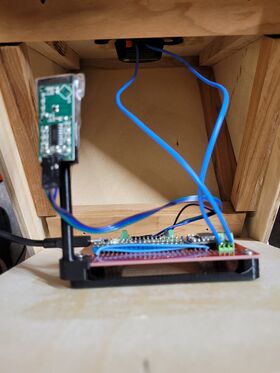Selkirk Marine Museum Piano: Difference between revisions
Ttenbergen (talk | contribs) No edit summary |
Ttenbergen (talk | contribs) No edit summary |
||
| Line 1: | Line 1: | ||
{{Project | {{Project | ||
|shortDescription=Museum display that will play audio when it detects the presence of visitors. | |shortDescription=Museum display that will play audio when it detects the presence of visitors. | ||
|longDescription=The project sits on top of a piano in the museum as part of a bigger display on music during the travels of the ship. When it detects the presence of visitors it plays some music. | |||
|geekery=We initially planned on housing the electronics right inside the piano, without making alterations to it to sense visitor presence or for the sound to get out. So, we used an integrated radar circuit to detect movement, and a surface mount speaker to play the music. This means the entire interaction with the museum environment can be hidden inside a display case completely. A Raspberry Pi Pico handles the processing. | |||
It was then decided that we would use a separate display after all, so we built the case out of baltic birch plywood. | |||
|skillSet=3D Modelling; 3D Printing; Electronics; Programming; Woodworking | |skillSet=3D Modelling; 3D Printing; Electronics; Programming; Woodworking | ||
|projectType=Museum Display | |projectType=Museum Display | ||
|northForge=No | |northForge=No | ||
}} | }} | ||
Revision as of 15:30, 2023 October 19
| Projects | |

| |
| Project: | Selkirk Marine Museum Piano (I) |
| Description: | Museum display that will play audio when it detects the presence of visitors. |
| Skillset(s) : |
3D Modelling • 3D Printing • Electronics • Programming • Woodworking |
| Project Type(s) : | |
The project sits on top of a piano in the museum as part of a bigger display on music during the travels of the ship. When it detects the presence of visitors it plays some music.
How we did it
We initially planned on housing the electronics right inside the piano, without making alterations to it to sense visitor presence or for the sound to get out. So, we used an integrated radar circuit to detect movement, and a surface mount speaker to play the music. This means the entire interaction with the museum environment can be hidden inside a display case completely. A Raspberry Pi Pico handles the processing.
It was then decided that we would use a separate display after all, so we built the case out of baltic birch plywood.